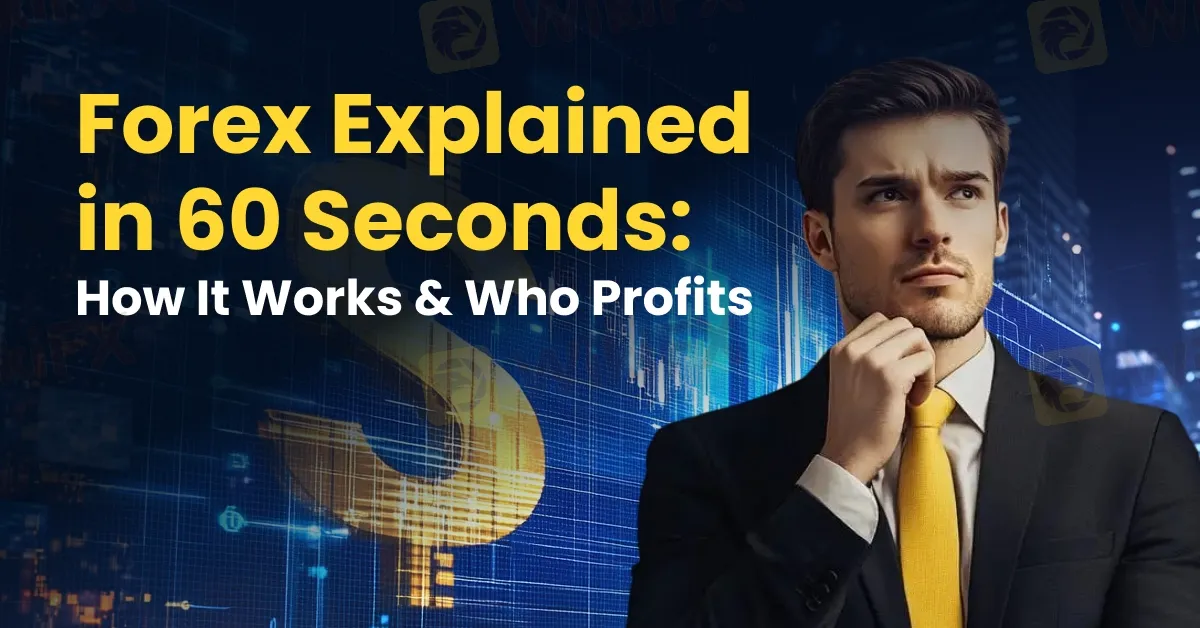简体中文
繁體中文
English
Pусский
日本語
ภาษาไทย
Tiếng Việt
Bahasa Indonesia
Español
हिन्दी
Filippiiniläinen
Français
Deutsch
Português
Türkçe
한국어
العربية
Forex Explained in 60 Seconds: How It Works & Who Profits
Abstract:Before diving into the forex market, it’s crucial to understand its mechanics, risks, and profit potential. Without a clear grasp of how forex operates, you risk losing money instead of making it. Here’s a concise breakdown to help you navigate this dynamic financial market.

Before diving into the forex market, it‘s crucial to understand its mechanics, risks, and profit potential. Many traders jump in, lured by stories of quick wealth, only to realise that success requires knowledge, strategy, and discipline. Without a clear grasp of how forex operates, you risk losing money instead of making it. Here’s a concise breakdown to help you navigate this dynamic financial market.

The foreign exchange (forex or FX) market is the largest financial market in the world, with a daily trading volume exceeding $7 trillion. Unlike stock markets that trade on centralised exchanges, forex operates over-the-counter (OTC), meaning currencies are traded electronically across global financial centres. Participants include banks, hedge funds, corporations, governments, and retail traders. Trading takes place 24 hours a day, five days a week, as major financial hubs in London, New York, Tokyo, and Sydney overlap.
Forex trading involves buying one currency while simultaneously selling another. Currencies are quoted in pairs (e.g., EUR/USD, GBP/JPY), where the first currency is the base, and the second is the quote. If a trader believes the base currency will strengthen against the quote currency, they buy the pair; if they expect it to weaken, they sell.
Trades are executed through brokers or trading platforms, often with leverage—a tool that allows traders to control larger positions with a fraction of the capital. However, leverage amplifies both potential gains and losses, making risk management essential.

Forex brokers make money in several ways. Most charge a spread—the difference between the bid (buy) and ask (sell) price. Some also charge commissions per trade or profit from traders' losses through a dealing desk model.
On the other hand, retail traders aim to profit from price fluctuations by speculating on market movements. Successful traders rely on technical analysis (charts and indicators), fundamental analysis (economic events and news), and risk management strategies. However, due to market volatility and high leverage, many retail traders lose money rather than turn a profit.

The forex market itself is not a scam. In fact, contrary to general beliefs, it is a legitimate financial marketplace. However, due to its decentralised nature, it has attracted scams in the form of fraudulent brokers, Ponzi schemes, and misleading ‘get-rich-quick’ trading courses. The key to staying safe is choosing a well-regulated broker (licensed by the FCA, CySEC, or another reputable authority) and avoiding unrealistic profit promises.
Forex trading offers vast opportunities, but it is not a shortcut to wealth. Education, strategy, and risk management are vital for success. Before risking real money, traders should practise on demo accounts and understand the markets complexities. With the right approach, forex can be a rewarding endeavour, but only for those who treat it with the respect and knowledge it demands.

Disclaimer:
The views in this article only represent the author's personal views, and do not constitute investment advice on this platform. This platform does not guarantee the accuracy, completeness and timeliness of the information in the article, and will not be liable for any loss caused by the use of or reliance on the information in the article.
Read more

Never Heard of Dynasty Trade? Here's Why You Should Be Worried
Have you heard this name before? No , it’s time you do because staying unaware could cost you. This platform is currently active in the forex trading and has been linked to several suspicious activities. Even if you’ve never dealt with it directly, there’s a chance it could reach out to you through ads, calls, messages, or social media. That’s why it’s important to know the red flags in advance.

Want to Deposit in the EVM Prime Platform? Stop Before You Lose It ALL
Contemplating forex investments in the EVM Prime platform? Think again! We empathize with those who have been bearing losses after losses with EVM Prime. We don't want you to be its next victim. Read this story that has investor complaints about EVM Prime.

WEEKLY SCAM BROKERS LIST IS OUT! Check it now
If you missed this week's fraud brokers list and are finding it difficult to track them one by one — don’t worry! We’ve brought together all the scam brokers you need to avoid, all in one place. Check this list now to stay alert and protect yourself from fraudulent brokers.

Catch the Latest Update on BotBro & Lavish Chaudhary
BotBro, an AI-based trading platform, became popular in India in 2024—but for negative reasons. Its founder, Lavish Chaudhary, who gained a huge following by promoting it heavily on social media. Since then, he has become well-known, but for many controversies. Let’s know the latest update about Botbro & Lavish Chaudhary.
WikiFX Broker
Latest News
Olymptrade Under Fire – Fraud Allegations and Investor Outrage
Hantec Markets Appoints New Executives for Growth in Dubai
Is the Forex Bonus a Genuine Perk or Just a Gimmick?
OctaFX Was Fined $37,000 for Operating Without a License
What Role do signals play in the forex trading?
5 Reasons Why Traders Are Losing Trust in Headway Broker
What WikiFX Found When It Looked Into Vestrado
Hantec Financial: A Closer Look at Its Licenses
eToro Joins Hands with Premiership Women’s Rugby
RM750 Million Lost to Investment Scams in Just Six Months
Currency Calculator


